#biodegradabletableware
Video
youtube
Biodegradable Tableware Product | Shipaway Overseas | Exporter & Manufacturer
Biodegradable Tableware Product | Shipaway Overseas | Exporter & Manufacturer Manufacturer & Exporter 100% Eco Friendly - 100% Biodegradable & Compostable Biodegradable Tableware Product — Shipaway Overseas Biodegradable Tableware is made from organic, renewable material that may be composed entirely. It is a renewable and biodegradable resource that may be utilised to make compostable paper goods like plates, bowls, cups and cutlery. It has strong tensile strength, is waterproof, and flame resistant. You may also visit our website to find out more about us.
www.shipawayoverseas.com
Feel free to contact us if you have any queries.
Call / WhatsApp: +91 9175411441 E-mail: [email protected]
#youtube#biodegradable#bagassetableware#biodegradabletableware#ecofriendlyproducts#compostableproducts#sustainableproducts#hygienicproducts#shipawayoverseas#foodcontainer
2 notes
·
View notes
Text
The Educational Role of Biodegradable Products Tableware in Promoting Sustainability
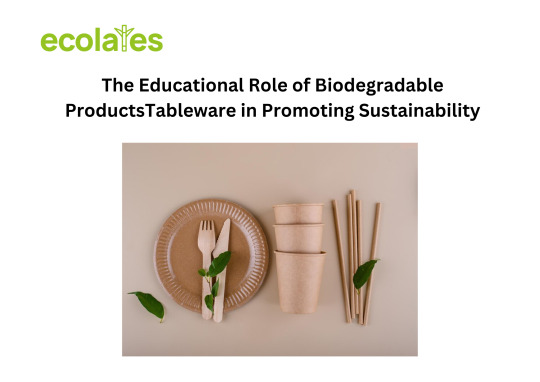
In a world increasingly conscious of environmental issues, the journey toward sustainability involves not just adopting eco-friendly practices but also educating the masses. One often-overlooked yet powerful tool in this educational journey is biodegradable product tableware, particularly those crafted from bagasse. In this blog, we delve into the educational role of these products in promoting sustainability, shedding light on their impact beyond being just a green alternative.
Introduction: The Green Revolution in Tableware
As we navigate the path towards a sustainable future, every aspect of our lives comes under scrutiny. Even seemingly mundane items like tableware play a crucial role in the larger narrative of environmental responsibility. Biodegradable products, with a spotlight on bagasse-based tableware, emerge not only as eco-friendly alternatives but also as valuable tools for educating individuals about the importance of sustainable living.
1. Bagasse Products in Action: A Visual Lesson in Sustainability
The very nature of bagasse products provides a tangible illustration of sustainability in action. By incorporating these items into our daily lives, we create a visible and continuous reminder of the need to move away from traditional, non-biodegradable materials. It becomes a daily lesson that subtly reinforces the idea that our choices matter and contribute to the broader environmental picture.
2. Understanding the Lifecycle: A Lesson in Environmental Impact
Biodegradable products, especially those made from bagasse, offer a unique opportunity to educate users about product lifecycles. From the growth of sugarcane to the transformation into tableware and eventual biodegradation, this lifecycle story unfolds a narrative of sustainability. It fosters a deeper understanding of the environmental impact of consumer choices and encourages mindful decision-making.
3. Reducing Plastic Dependency: Breaking the Single-Use Habit
One of the key educational aspects of bagasse products lies in their role as alternatives to single-use plastics. By choosing bagasse-based tableware, individuals actively participate in reducing their plastic dependency. This shift in behavior not only benefits the environment but also serves as a personal lesson in breaking free from the convenience-oriented, throwaway culture that dominates the modern world.
4. Composting Education: From Waste to Nutrient-Rich Soil
Bagasse products, being biodegradable, contribute to the education of composting practices. Understanding that these items can be composted, returning nutrients to the soil rather than lingering in landfills, adds a layer of ecological literacy to the everyday choices we make. It’s a lesson in turning waste into a resource, providing a more sustainable end to the product lifecycle.
5. Corporate Responsibility: Lessons from Ethical Business Practices
Choosing bagasse products extends beyond individual responsibility; it highlights the role of businesses in fostering sustainability. Companies investing in and promoting biodegradable tableware showcase a commitment to ethical and environmentally responsible business practices. This, in turn, educates consumers about the importance of supporting businesses aligned with their values and contributing to the larger sustainability movement.
6. Community Engagement: Building Green Conversations
The adoption of bagasse products encourages community engagement in discussions around sustainability. Whether it’s at community events, social gatherings, or educational institutions, the presence of biodegradable tableware sparks conversations about the environmental impact of daily choices. It becomes a catalyst for shared learning experiences and a communal commitment to eco-friendly practices.
7. Educational Partnerships: Schools and Institutions Leading by Example
Educational institutions play a pivotal role in shaping the values and behaviors of future generations. By adopting bagasse-based tableware in cafeterias and events, schools and institutions become educational leaders in sustainability. Students witness firsthand the integration of eco-friendly practices, reinforcing the importance of such choices in their daily lives.
Conclusion: Beyond Tableware — A Lesson in Global Citizenship
In conclusion, the educational role of biodegradable products, specifically bagasse-based tableware, transcends the act of dining sustainably. It becomes a multifaceted lesson, weaving together visuals of environmental impact, lifecycle understanding, reduction of plastic dependency, composting education, corporate responsibility, community engagement, and educational partnerships. By incorporating these products into our daily routines, we not only make a small but impactful contribution to the environment but also become active participants in the larger narrative of global citizenship and sustainability.
#ecolates #ecolatespvtltd #bioderadableproducts #biodegradabletableware #ecofriendlyproducts #sustainableproducts
#ecolates#ecolatespvtltd#bioderadableproducts#biodegradabletableware#ecofriendlyproducts#sustainableproducts
0 notes
Video
Dear all, Proudly introducing long-awaited "Parason Forming Machine" to fight against single-time use plastic and save planet Earth! This one step forward to the manufacturing of Molded fiber-forming machine helps Parason to provide 100% turnkey solution for molded fiber industry.
More developments on the way:
- Smart DCS based Pulp mill
- Robotic integration of forming machine
- Heat transfer efficient molds
- Three different version of Trimming Machine
- Different version of forming machine to suit different molds
For more information visit: www.parason.com
#Parason #manufacturing #circulareconomy #artificialintelligence #innovation #packaging #formingmachine #tablewaremachine #sustainabletableware #ecofirendlytableware #tableware
#tableware#disposable tableware#DisposableTableware#biodegradabletableware#tableware machine#molded fiber#moldedpulp#moldedfiber#molded fiber products#forming machine
0 notes
Photo
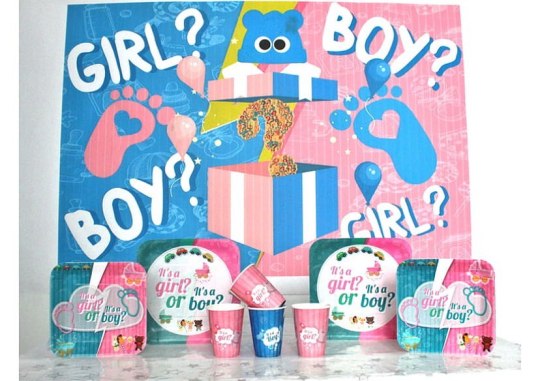
Baby 👶🏼 Gender Reveals 👉🏻 RAE7. COM Discover the baby’s gender in the most original way saying the planet with our decorations!!! #biodegradable #biodegradabletableware #babygenderreveals #boyorgirl #partytime #party #partytime #partydecorations #partyideas #partyinspiration (at United States of America) https://www.instagram.com/p/CANbboRANPF/?igshid=i7e85vs4x62u
#biodegradable#biodegradabletableware#babygenderreveals#boyorgirl#partytime#party#partydecorations#partyideas#partyinspiration
0 notes
Photo

Today's tiffin inspiration is this soft and spongy Kal Dosai with Tomato Chutney . This Tomato Chutney is my MIL's recipe . Quick , Easy and tasty . 1. Grind 4 tomatoes into a puree. 2. Heat a pan/ kadai with oil and temper with mustard seeds and curry leaves. 3. Add the puree, chilli powder, salt and a pinch of fenugreek powder. 4. Cook till the raw smell of tomatoes disappear. 5. Garnish with cilantro . Delicious as dip and spread on toasts too . . . . #masterchefmom #breakfast #inspiration #instaphoto #delhi #dosai #chutney #tamilnadu #tamilnadutiffin #sustainableliving @theglobalgoals #biodegradabletableware #tiffinsofindia #foodofindia #tomato #foodstyling #madras #vegansofig #veganrecipes #foodporn #foodies #instagood #glutenfreefood #vegetarian #foodporn #homemade #homefood #momknowsbest #indiancuisine
#biodegradabletableware#tamilnadutiffin#homemade#vegetarian#veganrecipes#dosai#chutney#indiancuisine#foodstyling#foodporn#foodies#instaphoto#tamilnadu#glutenfreefood#inspiration#breakfast#momknowsbest#tiffinsofindia#foodofindia#tomato#homefood#instagood#masterchefmom#sustainableliving#delhi#madras#vegansofig
0 notes
Text
The Future of Dining: Trends in Biodegradable Products Tableware Design

Introduction: As we navigate the ever-evolving landscape of sustainable living, the future of dining is undergoing a remarkable transformation. An integral part of this shift is the innovative design of biodegradable products tableware, with materials like bagasse taking center stage. In this blog, we’ll delve into the emerging trends shaping the future of dining experiences and how biodegradable tableware is becoming a stylish and eco-conscious choice.
1. Fusion of Style and Sustainability: In the past, sustainable dining options were often associated with plain and utilitarian designs. However, a significant trend in biodegradable tableware design is the fusion of style and sustainability. Manufacturers are embracing chic and contemporary aesthetics, proving that eco-friendly doesn’t mean compromising on style. Bagasse products, with their versatile design possibilities, are at the forefront of this trend.
2. Customizable Dining Experiences: Biodegradable tableware is not only environmentally friendly but is also becoming a canvas for customizable dining experiences. From personalized plates for special occasions to branded tableware for events, the versatility of bagasse allows for a range of design options. This trend empowers consumers to make sustainable choices while still expressing their individuality in their dining setups.
3. Artistic Patterns and Textures: Designers are exploring artistic patterns and textures to elevate the visual appeal of biodegradable tableware. Bagasse, with its natural fibers, provides a unique canvas for intricate designs, textures, and patterns. The incorporation of these elements not only enhances the aesthetic appeal of the tableware but also connects diners with the organic origins of the materials.
4. Minimalist and Functional Forms: In line with the broader trend of minimalism, biodegradable tableware is embracing clean and functional forms. Bagasse products are being designed with simplicity and functionality in mind, emphasizing the beauty of uncluttered designs. This minimalist approach not only aligns with contemporary design preferences but also contributes to a clutter-free dining experience.
5. Collaborations with Artists and Designers: To push the boundaries of creativity, manufacturers of biodegradable tableware are increasingly collaborating with artists and designers. These partnerships result in limited edition or artist-designed tableware collections, bringing an element of exclusivity to sustainable dining. Bagasse, as a versatile material, allows for these creative collaborations to flourish.
6. Eco-Friendly Packaging Integration: Beyond the tableware itself, a notable trend is the integration of eco-friendly packaging for biodegradable products. Bagasse packaging complements the tableware, creating a cohesive and sustainable dining experience from start to finish. This holistic approach reflects a commitment to reducing the environmental impact of the entire dining process.
7. Technological Advancements in Production: Advancements in technology are playing a crucial role in shaping the design landscape of biodegradable tableware. From 3D printing to innovative molding techniques, manufacturers are leveraging technology to create intricate and precisely designed bagasse products. This marriage of technology and sustainability ensures that the future of dining is not only stylish but also technologically advanced.
Conclusion: As we peer into the future of dining, it’s evident that biodegradable products tableware, particularly those made from bagasse, is poised to redefine our culinary experiences. The merging of style and sustainability, coupled with innovative design trends, opens up a world of possibilities for conscientious consumers. Embracing these trends not only enhances the visual appeal of our dining spaces but also contributes to a more sustainable and eco-conscious future. The journey towards a greener dining experience has never looked more promising.
#ecolates #ecolatespvtltd #bioderadableproducts #biodegradabletableware #ecofriendlyproducts #sustainableproducts
#ecolates#ecolatespvtltd#bioderadableproducts#biodegradabletableware#ecofriendlyproducts#sustainableproducts
0 notes
Text
Biodegradable Products Tableware for Outdoor Adventures and Picnics
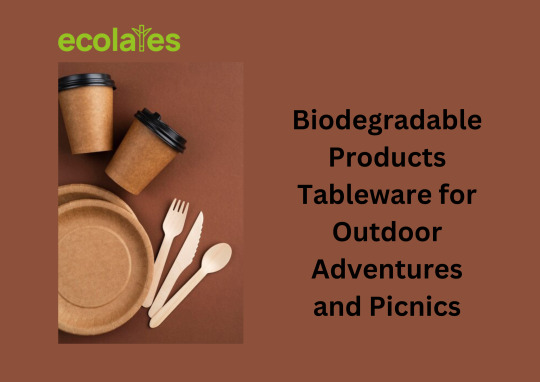
Introduction: As nature enthusiasts and outdoor adventurers, we cherish the beauty of the great outdoors and strive to minimize our environmental impact during our excursions. One simple yet impactful way to do so is by embracing biodegradable products tableware for our outdoor adventures and picnics. In this blog, we’ll explore the benefits and versatility of biodegradable tableware made from sustainable materials like bagasse, offering eco-conscious solutions for our outdoor dining experiences.
The Rise of Eco-Friendly Tableware: With growing concerns about plastic pollution and environmental degradation, consumers are increasingly turning to eco-friendly alternatives for their dining needs. Biodegradable products tableware, including plates, bowls, and utensils made from materials like bagasse, are gaining popularity for their sustainable attributes and minimal environmental footprint.
Bagasse: A Sustainable Material: At the heart of biodegradable tableware lies bagasse, a fibrous byproduct of sugarcane processing. Bagasse is renewable, biodegradable, and compostable, making it an ideal choice for eco-friendly tableware. By utilizing bagasse-based products, outdoor enthusiasts can enjoy their meals without worrying about contributing to plastic waste accumulation in natural environments.
Durability and Sturdiness: One common misconception about biodegradable tableware is that it lacks durability and sturdiness compared to traditional plastic or paper options. However, bagasse products offer exceptional strength and resilience, capable of withstanding various outdoor conditions, including moisture, heat, and pressure. Whether it’s a rugged camping trip or a leisurely picnic in the park, biodegradable tableware made from bagasse can handle the demands of outdoor dining with ease.
Lightweight and Portable: One of the key advantages of biodegradable tableware for outdoor adventures is its lightweight and portable nature. Unlike bulky ceramic or glassware, bagasse products are lightweight and easy to transport, making them ideal for backpacking trips, beach outings, or hiking excursions. Their compact design allows outdoor enthusiasts to pack efficiently without sacrificing convenience or functionality.
Eco-Conscious Disposal: After enjoying a delicious meal outdoors, disposing of biodegradable tableware is a breeze. Bagasse products can be composted in backyard compost bins or disposed of in municipal composting facilities, where they break down naturally into organic matter. By choosing biodegradable tableware, outdoor enthusiasts can minimize their environmental impact and contribute to a circular economy.
Versatile Applications: Biodegradable tableware made from bagasse is incredibly versatile, suitable for a wide range of outdoor dining scenarios. From casual picnics and barbecues to formal camping trips and outdoor events, bagasse products offer a sustainable alternative to single-use plastics and disposable paper plates. Their versatility makes them a favorite among eco-conscious consumers seeking practical and planet-friendly dining solutions.
Supporting Sustainable Practices: By opting for biodegradable tableware for outdoor adventures, individuals are not only making a positive impact on the environment but also supporting sustainable practices within the food service industry. As demand for eco-friendly alternatives grows, manufacturers are increasingly investing in innovative technologies and materials, further advancing the sustainability of biodegradable products tableware.
Conclusion: In conclusion, embracing biodegradable products tableware for outdoor adventures and picnics is a simple yet impactful way to reduce our environmental footprint and promote sustainable living. By choosing tableware made from renewable materials like bagasse, outdoor enthusiasts can enjoy their meals with peace of mind, knowing that they are making a positive contribution to the health of our planet. Let’s embark on our outdoor adventures armed with eco-friendly tableware, ensuring that our love for nature is reflected in every aspect of our outdoor experiences.
#ecolates #ecolatespvtltd #bioderadableproducts #biodegradabletableware #ecofriendlyproducts #sustainableproducts
#ecolates#ecolatespvtltd#bioderadableproducts#biodegradabletableware#ecofriendlyproducts#sustainableproducts
0 notes
Text
From Farm to Table: The Journey of Biodegradable Products Tableware

Introduction: In today’s environmentally conscious world, the journey of our everyday products has become a topic of growing interest. From the farm where raw materials are sourced to the table where products are used, understanding the lifecycle of biodegradable products tableware sheds light on their sustainability and impact. In this blog, we embark on a journey from farm to table, exploring the intricate process behind biodegradable tableware and its significance in our quest for eco-friendly alternatives.
1. Sourcing Sustainable Materials: The journey of biodegradable products tableware begins at the source — farms cultivating renewable materials such as sugarcane fiber, bamboo, or plant-based plastics. These materials are carefully selected for their sustainability and ability to biodegrade, ensuring minimal environmental impact from the outset.
2. Harvesting and Processing: Once harvested, the raw materials undergo a series of processing steps to transform them into usable forms for manufacturing. Sugarcane fiber, for example, is extracted from sugarcane stalks and refined into pulp, while bamboo is cut and processed into fibers. This stage requires efficient and eco-friendly practices to minimize waste and energy consumption.
3. Manufacturing and Production: With processed materials in hand, manufacturers employ innovative techniques to craft biodegradable tableware products. Molded into various shapes and sizes, these products undergo rigorous quality control measures to ensure durability, functionality, and adherence to sustainability standards. The manufacturing process integrates renewable energy sources and eco-friendly practices to further reduce environmental impact.
4. Distribution and Packaging: Once manufactured, biodegradable products tableware embarks on the next leg of its journey — distribution to retailers and consumers. Sustainable packaging options, such as compostable bags or recycled cardboard, are utilized to minimize waste and promote eco-conscious practices throughout the supply chain.
5. Utilization and Consumption: At the heart of the journey lies the utilization of biodegradable tableware products by consumers. From picnics in the park to family gatherings at home, these eco-friendly alternatives offer a guilt-free dining experience without compromising on quality or convenience. The widespread adoption of biodegradable tableware reflects a growing consumer demand for sustainable options in everyday life.
6. End-of-Life: Unlike traditional plastic tableware, the journey of biodegradable products tableware does not end in landfills or oceans. Instead, these products biodegrade naturally over time, returning to the earth without leaving behind harmful pollutants or microplastics. Proper disposal methods, such as composting or recycling, ensure that biodegradable tableware completes its lifecycle in a sustainable manner.
7. Environmental Impact and Benefits: Throughout its journey, biodegradable products tableware offers numerous environmental benefits compared to conventional plastic alternatives. From reducing greenhouse gas emissions and conserving natural resources to minimizing waste and pollution, the adoption of biodegradable tableware contributes to a cleaner, greener planet for future generations.
Conclusion: In conclusion, the journey of biodegradable products tableware exemplifies the principles of sustainability and responsible consumption. From farm to table, each step in the lifecycle of these eco-friendly alternatives underscores their positive impact on the environment and society. By choosing biodegradable tableware, consumers can play a vital role in promoting sustainability and fostering a more harmonious relationship with nature.
#ecolates #ecolatespvtltd #bioderadableproducts #biodegradabletableware #ecofriendlyproducts #sustainableproducts
#ecolates#ecolatespvtltd#bioderadableproducts#biodegradabletableware#ecofriendlyproducts#sustainableproducts
0 notes
Text
Eco-Friendly Eats: Exploring the World of Biodegradable Products Tableware
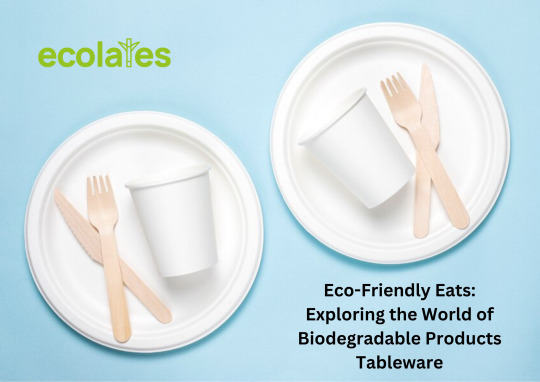
Introduction: In today’s eco-conscious society, the food industry is undergoing a significant transformation towards sustainability. As part of this movement, biodegradable products tableware has emerged as a promising alternative to traditional plastic tableware. From plates and cups to utensils and takeaway containers, biodegradable tableware offers a sustainable solution for both consumers and businesses alike. In this blog, we delve into the world of biodegradable products tableware, exploring its diverse range, manufacturing process, and its impact on the environment.
Diverse Range of Products: Biodegradable products tableware encompasses a wide array of dining essentials, each designed with sustainability in mind. From sturdy plates made from bagasse to sleek cutlery crafted from cornstarch, there is a biodegradable option available for every dining occasion.
Manufacturing Process: The production of biodegradable tableware begins with the selection of renewable materials such as sugarcane fiber, bamboo, or plant-based plastics. These raw materials are then processed and molded into various shapes and sizes using sustainable manufacturing techniques.
Durability and Functionality: Contrary to common misconceptions, biodegradable tableware is not only environmentally friendly but also durable and functional. These products are designed to withstand the demands of everyday use, offering the same level of performance as traditional plastic tableware.
Aesthetics and Design: In addition to their practicality, biodegradable products tableware also boasts attractive designs that cater to diverse preferences. Whether you prefer elegant dinnerware for formal events or colorful plates for casual gatherings, there is a biodegradable option to suit every style.
Cost-Effectiveness: While biodegradable tableware may initially seem more expensive than its plastic counterparts, it offers long-term cost savings by reducing environmental impact and waste disposal costs. Many businesses are recognizing the economic benefits of investing in sustainable alternatives.
Consumer Awareness and Demand: As awareness of environmental issues grows, consumers are increasingly seeking out eco-friendly dining options, including biodegradable products tableware. Businesses that prioritize sustainability can attract environmentally conscious customers and enhance their brand reputation.
Regulatory Compliance: With governments around the world implementing stricter regulations on single-use plastics, businesses are facing pressure to adopt more sustainable practices. Biodegradable tableware offers a compliant solution that aligns with evolving regulatory standards.
Conclusion: In conclusion, biodegradable products tableware represents a significant step towards a more sustainable future in the food industry. With its diverse range of products, sustainable manufacturing process, durability, and consumer demand, biodegradable tableware is poised to become a staple in eco-friendly dining. By embracing these environmentally friendly alternatives, businesses can reduce their environmental footprint and contribute to a greener planet for generations to come.
#ecolates #ecolatespvtltd #bioderadableproducts #biodegradabletableware #ecofriendlyproducts #sustainableproducts
#ecolates#ecolatespvtltd#bioderadableproducts#biodegradabletableware#ecofriendlyproducts#sustainableproducts
0 notes
Text
Biodegradable for All: Accessibility and Affordability
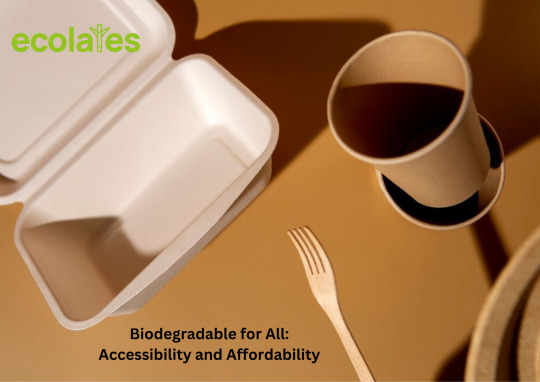
Introduction: In recent years, there has been a growing concern about the environmental impact of non-biodegradable products. As a result, the demand for biodegradable alternatives has surged. However, accessibility and affordability remain key challenges in ensuring that biodegradable products are available to all individuals, regardless of their economic status. In this blog, we will explore the importance of accessibility and affordability in the biodegradable product market, and discuss strategies to make these eco-friendly options accessible to everyone.
The Need for Biodegradable Products: The adverse effects of non-biodegradable products on the environment are well-documented. From plastic pollution in oceans to landfill waste, the urgency to transition to biodegradable alternatives has never been greater. Biodegradable products break down naturally, reducing their impact on ecosystems and minimizing the long-term environmental harm caused by traditional non-biodegradable products.
Overcoming Accessibility Challenges: Access to biodegradable products should not be limited to a select few. To ensure accessibility, it is crucial to address the challenges faced by individuals with limited access to physical stores or online platforms. Collaborating with local retailers, introducing biodegradable products in community markets, and partnering with social enterprises can enhance accessibility and create avenues for individuals to access these eco-friendly alternatives.
Enhancing Affordability: Affordability is a significant factor that determines the widespread adoption of biodegradable products. While some eco-friendly options may be costlier initially, strategies can be implemented to make them more affordable in the long run. Government subsidies or tax incentives can encourage manufacturers to lower prices. Additionally, economies of scale can be leveraged as demand for biodegradable products increases, leading to cost reductions and making them more affordable for consumers.
Promoting Education and Awareness: Education and awareness play a vital role in promoting the use of biodegradable products. By educating consumers about the harmful effects of non-biodegradable alternatives and the benefits of biodegradable options, individuals can make informed choices and actively contribute to environmental sustainability. Collaborating with schools, community organizations, and environmental advocacy groups can help spread awareness and empower individuals to seek out biodegradable alternatives.
Supporting Innovation and Research: Investing in research and development is crucial to drive innovation in biodegradable product manufacturing. This can lead to the development of new materials, improved production techniques, and increased affordability. Governments, private organizations, and academic institutions should collaborate to fund research initiatives, support startups working on biodegradable solutions, and incentivize innovation in this field.
Collaboration Across Industries: Creating a sustainable future requires collaboration across industries. Manufacturers, retailers, and policymakers must work together to establish standards and regulations that promote the use of biodegradable products. Collaboration can also lead to the development of sustainable supply chains, efficient distribution networks, and widespread availability of these products.
Conclusion: Biodegradable products hold immense potential in reducing the environmental impact of non-biodegradable alternatives. However, accessibility and affordability remain crucial factors in ensuring that these eco-friendly options are available to all individuals. By addressing these challenges through collaboration, education, innovation, and policy support, we can create a future where biodegradable products are accessible and affordable for everyone. Together, we can make a lasting positive impact on the environment and pave the way for a sustainable future.
#ecolates #ecolatespvtltd #biodegradableproducts #biodegradabletableware #sustainableproducts #ecofriendlytableware
#ecolates#ecolatespvtltd#biodegradableproducts#biodegradabletableware#sustainableproducts#ecofriendlytableware
0 notes
Text
Top 8 Biodegradable Products to Integrate into Your Daily Routine

Living an eco-friendly lifestyle is not just a trend but a conscious choice to contribute to a sustainable future. As we strive to reduce our environmental footprint, incorporating biodegradable products into our daily routine becomes a powerful step towards positive change. In this article, we’ll explore the best eight biodegradable products for daily use, offering practical alternatives that align with a greener way of life.
1. Biodegradable Trash Bags
Traditional plastic trash bags can take centuries to decompose, contributing significantly to environmental pollution. Opting for biodegradable trash bags made from materials like cornstarch or plant fibers ensures a quicker and eco-friendly decomposition process. These bags not only do the job effectively but also leave a minimal impact on the planet.
2. Biodegradable Cutlery
Disposable plastic cutlery is a common contributor to single-use plastic waste. Embrace sustainable dining with biodegradable cutlery crafted from materials such as bamboo, cornstarch, or even sugarcane bagasse. These alternatives offer the convenience of single-use items without the long-lasting environmental consequences.
3. Biodegradable Toothbrushes
Traditional plastic toothbrushes contribute to the plastic waste crisis, with billions ending up in landfills each year. Biodegradable toothbrushes made from materials like bamboo provide a sustainable oral care option. Bamboo is not only biodegradable but also a rapidly renewable resource, making it an eco-friendly choice for your daily dental routine.
4. Biodegradable Cleaning Products
From dish soaps to all-purpose cleaners, opting for biodegradable cleaning products ensures that your household chores have a minimal impact on the environment. Look for products with plant-based ingredients that break down naturally, leaving no harmful residues behind. These cleaners maintain a clean home while supporting a cleaner planet.
5. Biodegradable Plates and Utensils
Hosting an event or a picnic? Choose biodegradable plates and utensils instead of their plastic counterparts. Compostable plates made from materials like palm leaves or bagasse and utensils crafted from cornstarch are excellent alternatives that align with sustainable living.
6. Biodegradable Soap
Conventional soaps often contain chemicals that can harm aquatic ecosystems. Biodegradable soaps, on the other hand, are designed to break down easily without causing harm to the environment. Look for options with natural ingredients that are gentle on your skin and leave a smaller ecological footprint.
7. Biodegradable Food Storage Containers
Swap out plastic food storage containers with biodegradable alternatives. Containers made from materials like PLA (polylactic acid) or plant-based plastics offer a sustainable solution for storing leftovers and packed lunches. These containers decompose more efficiently, reducing the long-term impact on the environment.
8. Biodegradable Shopping Bags
Ditch single-use plastic bags in favor of biodegradable shopping bags. Many eco-friendly options are made from materials like cornstarch or cotton, providing a sturdy and sustainable alternative for your grocery runs. Keep a few reusable biodegradable bags on hand to reduce your reliance on traditional plastic bags.
Embracing a Greener Lifestyle
Incorporating these best eight biodegradable products into your daily life is a small yet impactful way to contribute to a healthier planet. By making conscious choices in our daily routine, we collectively move towards a more sustainable future. So, whether it’s in the kitchen, the bathroom, or during your daily chores, let these biodegradable alternatives be a part of your journey towards a greener lifestyle.
#ecolates #ecolatespvtltd #biodegradableproducts #biodegradabletableware #sustainableproducts #ecofriendlytableware
#ecolates#ecolatespvtltd#biodegradableproducts#biodegradabletableware#sustainableproducts#ecofriendlytableware
0 notes
Text
Navigating Green Choices: Biodegradable Products in E-commerce Packaging

In the ever-evolving landscape of e-commerce, where convenience often trumps environmental concerns, a new wave of change is emerging. “Navigating Green Choices: Biodegradable Products in E-commerce Packaging” sheds light on the transformative journey toward sustainability within the e-commerce industry. As businesses increasingly recognize the importance of adopting eco-friendly practices, the integration of biodegradable products in packaging solutions has become a beacon of positive change.
The Green Revolution Unveiled
Understanding Biodegradable Products
At the heart of this revolution lies the concept of biodegradability. Biodegradable products, crafted from organic materials like plant fibers, cornstarch, or sugarcane bagasse, possess a remarkable ability to decompose naturally. This stands in stark contrast to traditional packaging materials, offering a sustainable alternative that aligns with the principles of a circular economy.
E-commerce and the Urgency for Change
The Environmental Toll of Traditional Packaging
The surge in e-commerce has undeniably transformed the retail landscape, but it has come at a cost. Traditional packaging materials, often non-biodegradable and destined for landfills, contribute significantly to environmental degradation. The urgency to minimize this impact has fueled the adoption of biodegradable alternatives.
Biodegradable Products: A Win-Win for Businesses and the Planet
Businesses embracing biodegradable products in their packaging strategies find themselves at the intersection of profitability and environmental responsibility. The positive ripple effect extends beyond merely reducing the carbon footprint; it cultivates a positive brand image, fostering customer loyalty among the growing eco-conscious consumer base.
The Journey Towards Sustainability
Challenges and Solutions
While the transition to biodegradable packaging is promising, it is not without challenges. Businesses must navigate through misconceptions about the cost and durability of biodegradable materials. However, as technology advances and awareness grows, these challenges are gradually transforming into opportunities for innovation and positive change.
Educating Consumers
For this green revolution to reach its full potential, consumer awareness plays a pivotal role. The onus is on businesses to educate their customers about the benefits of biodegradable products. By doing so, they not only empower their clientele to make sustainable choices but also contribute to the broader societal shift towards eco-conscious living.
The Future of E-commerce Packaging
Innovations and Collaborations
The future of e-commerce packaging is undoubtedly green. Ongoing innovations in biodegradable materials, coupled with collaborations between businesses and eco-friendly packaging manufacturers, promise a landscape where sustainable choices are the norm rather than the exception.
Regulatory Support
Governments and regulatory bodies are increasingly recognizing the importance of sustainable practices. Supportive policies and incentives for businesses adopting biodegradable packaging materials serve as catalysts for widespread change. This collaborative approach ensures a harmonious relationship between industry practices and environmental stewardship.
Conclusion: Steering E-commerce Towards Sustainability
As businesses embark on the journey of “Navigating Green Choices: Biodegradable Products in E-commerce Packaging,” they not only contribute to a healthier planet but also position themselves as pioneers in responsible commerce. The collective effort to integrate biodegradable solutions into e-commerce packaging heralds a future where sustainability is not just a choice but an integral part of the online shopping experience.
#ecolates #ecolatespvtltd #biodegradableproducts #biodegradabletableware #sustainableproducts #ecofriendlytableware
#ecolates#ecolatespvtltd#biodegradableproducts#biodegradabletableware#sustainableproducts#ecofriendlytableware
0 notes
Text
Biodegradable Products: Nurturing Our Life and the Planet

Introduction:
In today’s era of increasing environmental awareness, the demand for sustainable and eco-friendly solutions has grown exponentially. Biodegradable products have emerged as a promising alternative to traditional materials, offering a way to reduce waste and minimize the impact on our planet. In this blog, we will explore the concept of biodegradable products and delve into how they nurture both our lives and the planet we call home.
Understanding Biodegradable Products:
Biodegradable products are those that can naturally decompose and return to the environment without causing harm or leaving behind toxic residues. Unlike traditional materials that persist in landfills for hundreds of years, biodegradable products are designed to break down into natural elements through natural processes like microbial activity, heat, and moisture.
Reducing Waste and Environmental Impact:
One of the most significant advantages of biodegradable products is their ability to reduce waste and minimize environmental impact. Traditional materials like plastics take centuries to decompose, contributing to land and ocean pollution. Biodegradable products, on the other hand, break down relatively quickly, reducing the burden on landfills and lessening the overall environmental footprint.
Promoting a Circular Economy:
Biodegradable products play a vital role in promoting a circular economy. By embracing biodegradable materials, we can shift away from the linear “take-make-dispose” model and move towards a system that focuses on reuse, recycling, and natural decomposition. Biodegradable products can be composted or used to produce renewable energy, contributing to a closed-loop system where resources are continuously utilized.
Sustainable Packaging Solutions:
One area where biodegradable products have made significant strides is in sustainable packaging solutions. Traditional plastic packaging poses a significant environmental challenge, but biodegradable alternatives such as bioplastics and compostable materials offer a more sustainable option. Biodegradable packaging can help reduce waste, lower carbon emissions, and preserve natural resources.
Biodegradable Textiles and Fashion:
The fashion industry is notorious for its environmental impact, but biodegradable textiles are offering a greener alternative. Fabrics made from natural fibers like bamboo, hemp, and organic cotton are biodegradable and can break down harmlessly after their useful life. This shift towards biodegradable textiles is transforming the fashion industry and promoting sustainable practices.
Biodegradable Personal Care Products:
The beauty and personal care industry has also embraced the concept of biodegradable products. Natural ingredients and biodegradable packaging are becoming increasingly popular, reducing the use of harmful chemicals and minimizing waste. Biodegradable personal care products nurture our bodies while treading lightly on the planet.
Biodegradable Cleaning Products:
Cleaning our homes should not come at the expense of the environment. Biodegradable cleaning products offer an eco-friendly alternative to traditional cleaners that often contain harsh chemicals and non-biodegradable ingredients. By choosing biodegradable cleaning products, we can maintain a clean and healthy living environment without compromising the health of our planet.
Conclusion:
Biodegradable products have emerged as a beacon of hope in our quest for a sustainable future. From reducing waste and minimizing environmental impact to promoting a circular economy and nurturing our lives, these products offer a viable solution to the challenges posed by traditional materials. By embracing biodegradable products in various sectors like packaging, textiles, personal care, and cleaning, we can contribute to a healthier planet and leave a positive legacy for future generations.
#ecolates #ecolatespvtltd #biodegradableproducts #biodegradabletableware #sustainableproducts #ecofriendlytableware
#ecolates#ecolatespvtltd#biodegradableproducts#biodegradabletableware#sustainableproducts#ecofriendlytableware
0 notes
Video
youtube
Manufacturer & Exporter Biodegradable Tableware Product - SHIPAWAY OVERSEAS
#shipawayoverseas#bagassetableware#biodegradable#biodegradableplates#biodegradabletableware#ecofriendlyproducts#sustainableproducts
0 notes
Text
instagram
#compostableproducts#biodegradable#biodegradabletableware#shipawayoverseas#ecofriendlyproducts#sustainableproducts#Instagram
1 note
·
View note